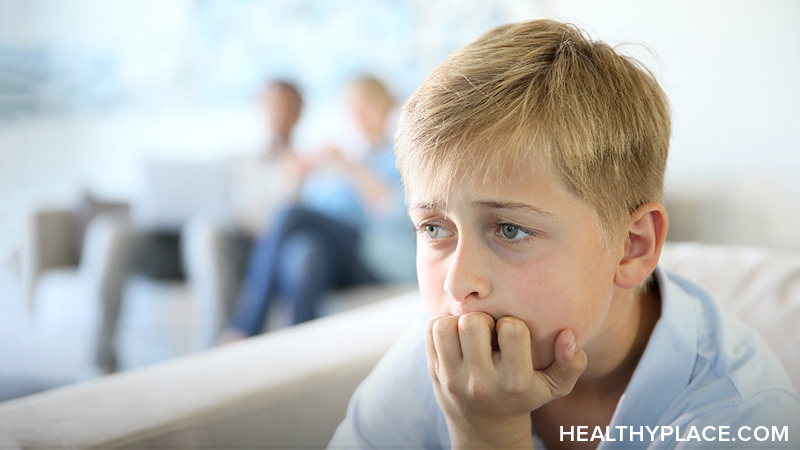Must-Have Skills for Parenting Children with Anxiety

Parenting children with anxiety can be challenging and heart-breaking. No parent wants to see their child suffer because of anxiety, but it can be hard to know what to do. You want to comfort your child and respect their all-too-real feelings, but you also don’t want to inadvertently reinforce fears and worries. To help you help your child, use these must-have skills for parenting a child with anxiety.
A Must-Have Skill for Parenting Children with Anxiety
Know When Your Anxious Child Needs Help
When anxiety, fears, and worries trap your child, it’s almost impossible for them to escape alone. It is entirely possible, however, for them to learn to deal with their anxiety. Parents can build skills to help their anxious child.
How parents respond to a child with anxiety is important and can reinforce or reduce their anxiety. Knowing what does and does not work will help you help your child.
What Does Not Work When You’re Parenting Your Child with Anxiety
In wanting kids to relax and stop worrying, it might be tempting to downplay your child’s fears, telling them to “just get over it,” or stop “looking for attention.” When they think you’re brushing off their experiences, children often are hurt and even begin to pull away from you, creating a rift in your relationship.
Many well-meaning parents want to make their child’s anxiety disappear. To do this, they accommodate the anxiety. If a child has a fear of going to school, for example, parents sometimes decide to homeschool and/or use an online service. This reinforces the fear, sending the message that you think your child has a reason to be fearful or worried about school. It also teaches that avoidance is a good way to handle anxiety.
Giving negative consequences or punishments for anxious behavior also doesn’t work. Rather than teaching kids that facing their anxiety is better than being punished for it, this approach only teaches kids that they’re bad for having anxiety.
Instead of these ineffective or even harmful approaches to your child’s anxiety, try the following effective strategies and skills.
Parenting Children with Anxiety with Effective Parenting Skills
Parenting skills, including parenting an anxious child, are learned and honed with practice. These skills have all been shown to work to reduce anxiety in kids. Three categories of effective skills are communication, behaviors, and perspective.
Communication skills involve talking, listening, and nurturing respect:
- Helping your child understand what anxiety is and how they feel it in their body, thoughts, and feelings
- Asking what makes them anxious and listening to their answer
- Brainstorming with your child about what might happen if a fear came true and how they would handle it
- Expressing confidence that they can handle their anxiety and the strengths they possess to do it
- Letting them know you understand how miserable anxiety makes them feel
- Listening so they feel heard
- Asking open questions (How are you feeling about the birthday party today?) instead of closed, leading ones (Are you worried about the birthday party this afternoon?)
Behavioral skills involve things parents and kids can do to get through anxious times, such as:
- Involvement; kids need their parents to be involved in their lives, and when they feel secure, supported, and valued, they are better equipped to face fears and worries
- Lifestyle changes; make sure your child is eating properly, getting enough quality sleep, and being active every day because these combat anxiety from the inside out
- Face problems instead of avoiding; it’s more difficult at first, but learning how to do things despite anxiety establishes a powerful life skill
- Discipline; to discipline a child with anxiety means focusing on the behavior rather than on your child (they need to know that even if you don’t like what they did, you still love them)
Perspective refers to someone’s outlook on a situation. Parents can help kids develop a healthy perspective on anxiety. One of the most valuable attitudes is that a problem doesn’t have to be gone before your child can move forward. When kids know that things don’t have to be perfect and that they don’t have to suddenly love a situation they feared, they learn that they get to choose how to respond to their worries.
The goal of these skills for parenting a child with anxiety is not to cure all anxiety immediately. Instead, it’s to have anxiety and stand up to it, to do things anyway, and to handle anxiety throughout life. As you help them stare down anxiety and survive, not only will their anxiety begin to decrease, but their belief in themselves will soar.
Use these skills to help them thrive with or without anxiety.
See Also:
APA Reference
Peterson, T.
(2022, January 17). Must-Have Skills for Parenting Children with Anxiety, HealthyPlace. Retrieved
on 2026, January 30 from https://www.healthyplace.com/parenting/children-with-mental-illness/must-have-skills-for-parenting-children-with-anxiety



